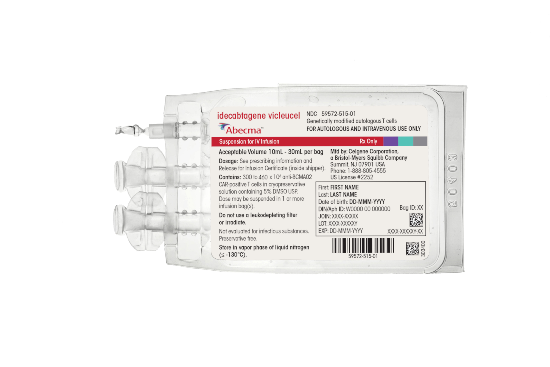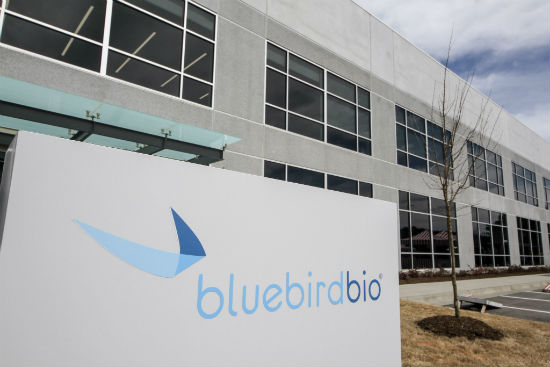
FDA OKs Landmark Bluebird Bio, Bristol Myers Blood Cancer Therapy

bluebird bio has hit a major milestone, garnering U.S. Food and Drug Administration approval to market its first product in the U.S., which is also its first cell therapy designed to treat cancer.
The publicly traded Massachusetts gene and cell therapy company, with a wholly owned manufacturing site in Durham, announced the federal okay late Friday night, along with its commercial partner in the therapy’s development, New Jersey-based drug giant Bristol Myers Squibb.

The FDA approval gives American adults with the deadly blood cancer known as multiple myeloma a new option if they’ve been unsuccessfully treated with four or more other lines of therapy. The new product, Abecma (idecabtagene vicleucel, also abbreviated as ide-cel), is a personalized immune cell therapy approved as a one-time infusion. It will launch with a wholesale price, before any discounts or rebates, of $419,500.
It’s described by the companies as “the first B-cell maturation antigen (BCMA)-directed chimeric antigen receptor (CAR) T cell immunotherapy for the treatment of adult patients with relapsed or refractory multiple myeloma after four or more prior lines of therapy, including an immunomodulatory agent, a proteasome inhibitor, and an anti-CD38 monoclonal antibody.”
Multiple myeloma an incurable blood cancer
Despite advances in treatment, multiple myeloma remains an incurable disease characterized by periods of remission and relapse. Most patients experience relapse following initial therapies, and depth and duration of response as well as survival outcomes decrease with each successive treatment. Patients with relapsed or refractory multiple myeloma who have been exposed to all three major drug classes (triple-class exposed), including an immunomodulatory agent, a proteasome inhibitor and an anti-CD38 antibody, tend to demonstrate poor clinical outcomes with very low response rates (20% to 30%), short duration of response (2 to 4 months) and poor survival.
Nikhil Munshi, M.D., associate director of the Jerome Lipper Multiple Myeloma Center at Dana-Farber Cancer Institute in Boston, said this new therapy “elicited rapid responses in the majority of patients, and these deep and durable responses were observed in patients with triple-class exposed and refractory multiple myeloma.
“As a treating physician, I often work with patients with relapsed or refractory multiple myeloma who are in critical need of new therapies. Now, with the approval of ide-cel as the first anti-BCMA CAR T cell therapy, we are excited to finally be able to offer patients a new, effective personalized treatment option that is delivered through a single infusion.”
bluebird provides lentiviral vector, BMY produces final product
The companies said Abecma will be manufactured for each individual patient using the patient’s own T cells at Bristol Myers Squibb’s cellular immunotherapy manufacturing facility in Summit, New Jersey. The lentiviral vector, which is used to engineer the CAR T cells, was developed by bluebird bio and is among the products made at its 125,000-square-foot Durham facility.

Abecma patients, caregivers and physician teams can access relevant information, manufacturing updates and patient and caregiver support through Cell Therapy 360, a digital service platform provided to optimize the Abecma patient and physician treatment experience. Various programs and resources will also be offered to help address the needs of patients and caregivers and provide support that allows for access to therapies, including Abecma.
Due to the specialized nature of administering cell therapy, Abecma will be available at certified treatment centers throughout the country. A Risk Evaluation and Mitigation Strategy (REMS) program will be implemented at certified centers to support appropriate use of Abecma including training on the management of cytokine release syndrome and neurologic toxicities.
bluebird in Triangle's global hub of gene, cell therapy companies
bluebird purchased its Durham facility in November 2017 and began operating in 2019, with more than 80 scientists, engineers, manufacturing and operations personnel involved in production, quality control testing and warehousing. They produce lentiviral vector for the company’s gene and cell therapies, including treatments for multiple myeloma, transfusion-dependent β-thalassemia and sickle cell disease.

It's among a fast-growing community of gene- and cell-therapy companies that have established or expanded major facilities in the Triangle to take advantage of a rich ecosystem of science and workforce talent.
In January 2020 bluebird launched its first marketed product, a treatment for a severe inherited blood disorder, in Germany. The therapy, LentiGlobin, marketed as ZYNTEGLO, is a one-time gene therapy that addresses the underlying genetic cause of transfusion-dependent β-thalassemia (TDT), an inherited blood disorder caused by a mutation in the β-globin gene. It interferes with red blood cell production, leading to severe anemia.
Until now, TDT patients faced a lifelong regimen of blood transfusions to survive and suppress symptoms of the disease. These transfusions often led to serious complications and organ damage from iron overload.
This ZYNTEGLO therapy, however, can reduce or even eliminate the need for blood transfusions. ZYNTEGLO has also been granted Orphan Drug status and Breakthrough Therapy designation for treating TDT by the U.S. Food and Drug Administration. However, it is not yet approved in the U.S.
“bluebird's dedication and passion for improving the lives of patients is apparent with every interaction,” said Laura Rowley, Ph.D., director of life science economic development for the North Carolina Biotechnology Center, which provided technical support to bluebird’s recruitment to the state. “This approval marks an exciting milestone for bluebird, and we’re honored for our community to contribute to the company’s success.”
The goal of gene therapy is to change or replace faulty genes with functional genes in order to prevent, treat or cure a disease. Vectors are selected parts of viruses that have been genetically modified so they can deliver new genes into cells without causing an infectious disease.
bluebird is working on a spectrum of disorders using three gene therapy technologies: gene addition, cell therapy and (megaTAL-enabled) gene editing.
The company is headquartered in Cambridge, Mass., and besides the Durham manufacturing facility, it has other sites in Seattle and Zug, Switzerland.
bluebird’s stock shares are traded on the NASDAQ market under the ticker symbol BLUE.
